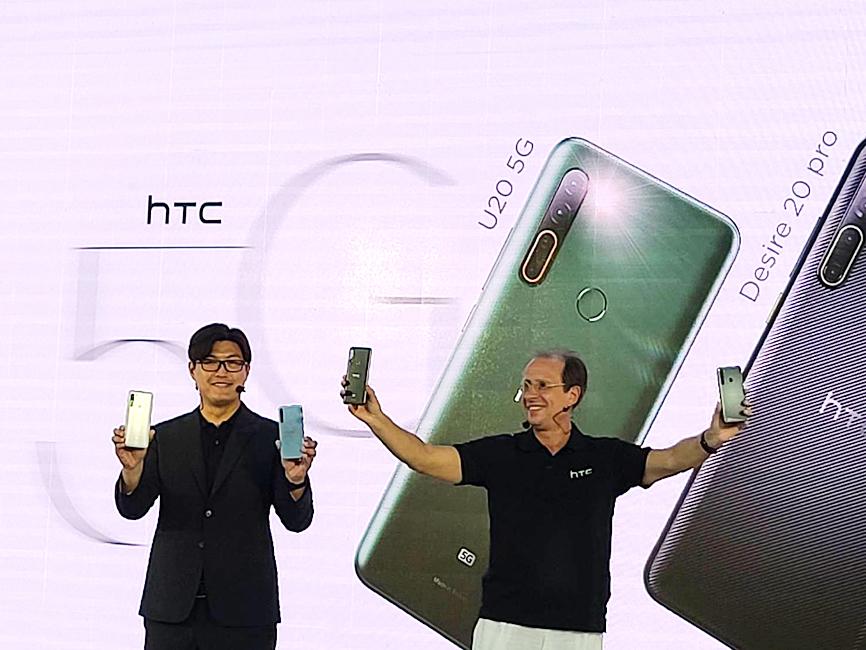HTC Corp (宏達電) yesterday posted a NT$1.83 billion (US$62 million) loss for last quarter, its 9th consecutive quarterly loss, as its expansion into virtual-reality headsets has yet to bear fruit, it said in a filing with the Taiwan Stock Exchange.
On an annual basis, that was an improvement from the NT$2.22 billion loss it registered in the same period last year, but on a quarterly basis, it widened from a loss of NT$1.68 billion in the first quarter.
Second-quarter revenue was NT$1.34 billion, up 1.02 percent sequentially, but down 52.14 percent from a year earlier.

Photo: Wang Yi-hung, Taipei Times
Gross margin rose to 26.5 percent from 20.3 percent a year earlier, also up from 26.3 percent in the first quarter.
For the first half of this year, HTC posted a net loss of NT$3.5 billion, an improvement from a loss of NT$4.68 billion in the first half of last year. That represented a loss of NT$4.28 per share, better than its loss of NT$5.69 per share in the same period last year.
The company swung back briefly to a profit in the first quarter of 2018 by selling part of its smartphone unit to Alphabet Inc’s Google, resulting in a US$1.1 billion windfall. However, its downward spiral has continued with losing quarters ever since.
HTC has not lacked for innovation, introducing Exodus, the first blockchain smartphone, in 2018. In June, the company unveiled the HTC U20 5G, the first made in Taiwan 5G mobile phone.
The company has also diversified away from its core cellphone business by investing heavily in virtual-reality technology with its Vive range of headsets. However, its VR operations still account for only a small fraction of the company's sales.

South Korea’s equity benchmark yesterday crossed a new milestone just a month after surpassing the once-unthinkable 5,000 mark as surging global memory demand powers the country’s biggest chipmakers. The KOSPI advanced as much as 2.6 percent to a record 6,123, with Samsung Electronics Co and SK Hynix Inc each gaining more than 2 percent. With the benchmark now up 45 percent this year, South Korea’s stock market capitalization has also moved past France’s, following last month’s overtaking of Germany’s. Long overlooked by foreign funds, despite being undervalued, South Korean stocks have now emerged as clear winners in the global market. The so-called “artificial intelligence

NEW IDENTITY: Known for its software, India has expanded into hardware, with its semiconductor industry growing from US$38bn in 2023 to US$45bn to US$50bn India on Saturday inaugurated its first semiconductor assembly and test facility, a milestone in the government’s push to reduce dependence on foreign chipmakers and stake a claim in a sector dominated by China. Indian Prime Minister Narendra Modi opened US firm Micron Technology Inc’s semiconductor assembly, test and packaging unit in his home state of Gujarat, hailing the “dawn of a new era” for India’s technology ambitions. “When young Indians look back in the future, they will see this decade as the turning point in our tech future,” Modi told the event, which was broadcast on his YouTube channel. The plant would convert

‘SEISMIC SHIFT’: The researcher forecast there would be about 1.1 billion mobile shipments this year, down from 1.26 billion the prior year and erasing years of gains The global smartphone market is expected to contract 12.9 percent this year due to the unprecedented memorychip shortage, marking “a crisis like no other,” researcher International Data Corp (IDC) said. The new forecast, a dramatic revision down from earlier estimates, gives the latest accounting of the ongoing memory crunch that is affecting every corner of the electronics industry. The demand for advanced memory to power artificial intelligence (AI) tasks has drained global supply until well into next year and jeopardizes the business model of many smartphone makers. IDC forecast about 1.1 billion mobile shipments this year, down from 1.26 billion the prior

People stand in a Pokemon store in Tokyo on Thursday. One of the world highest-grossing franchises is celebrated its 30th anniversary yesterday.